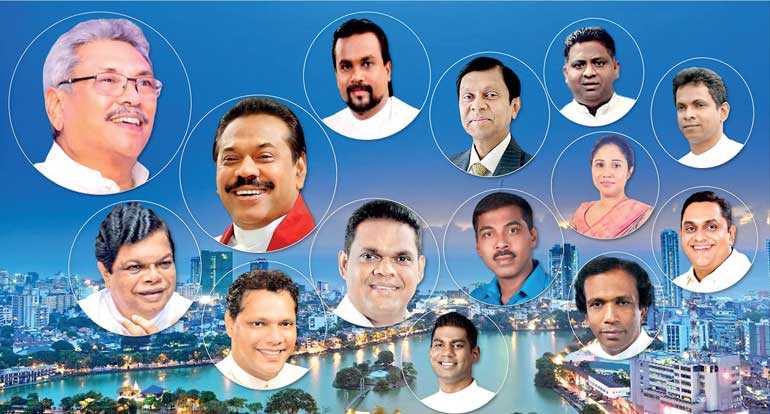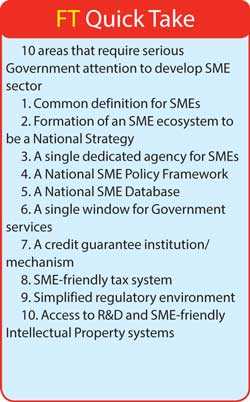Friday Feb 20, 2026
Friday Feb 20, 2026
Wednesday, 9 December 2020 00:00 - - {{hitsCtrl.values.hits}}

The new Government has appointed several State ministers responsible for certain identified industries and altogether there are over 15 different ministers to look into different aspects of local industries inclusive of SMEs. However, there is no specific ministry or minister to take the overall ownership of SMEs in the country
I started to write this article series to initiate a dialogue among policy makers, interested parties as well as SMEs towards building a robust mechanism in the country to cultivate and serve the SMEs. 
Accordingly, in the first article I emphasised the need for a more holistic and dynamic approach consisting of an interactive and systemic view of individuals, institutions and firms within an entrepreneurship context to support SMEs, beyond fragmented activities with short term reliefs.
The Budget proposals for 2021 have already been spelled out and the Minister of Money and Capital Markets and State Enterprise Reforms Ajith Nivard Cabraal indicated that this year’s Budget has been drafted with a long-term development goals in mind to offer economic prosperity to all, rather than offering the traditional short-term relief for a few. Despite the pressure in managing its own finances owing to the impact of ongoing COVID-19 pandemic, the stance taken by the Government to extend further relief measures to support the households and business community must be commended.
The proposals include specific tax reliefs and incentives to promote entrepreneurship and support local industries demonstrating the policy continuity of the Government. However, the longevity of the impact stemming from these measures on the SME sector is dependent on the existence of a robust ecosystem for SMEs, given the high vulnerability and the uniqueness of the needs and challenges of this segment.
Accordingly, in this article I discuss 10 areas that require serious attention of the Government to develop the SME sector which is considered the “backbone” of the economy. I hope the respective authorities and political leadership will take a note of these points and act upon them appropriately.
1. Common definition for SMEs
SMEs are defined in a variety of ways by various countries using parameters such as number of employees, capital invested, turnover or nature of the business, etc. In Sri Lanka, there is no common definition for SMEs. Different Government agencies, banks and various institutions use different criteria to identify SMEs to meet the requirements of each institution. Further, there are different terms used to identify this sector.
Small and medium industries or enterprises, micro enterprises, rural enterprises, small and medium  activities, cottage and small-scale industry, etc. are some of the terms used. As a result, when these terms are used in any policy framework or a document there is ambiguity as to what businesses are qualified to avail the services and benefits of each program. Lack of a uniform definition among different institutions, has also prevented generating precise insights and statistics about the sector for effective decision making and resource allocation.
activities, cottage and small-scale industry, etc. are some of the terms used. As a result, when these terms are used in any policy framework or a document there is ambiguity as to what businesses are qualified to avail the services and benefits of each program. Lack of a uniform definition among different institutions, has also prevented generating precise insights and statistics about the sector for effective decision making and resource allocation.
Therefore, a common definition for SMEs should be the starting point of the national agenda for SMEs.
2. Formation of an SME ecosystem to be a National Strategy
Everyone agrees that the SME sector is the backbone of the economy. However, the million-dollar question is whether the due priority is given in the national strategy to form a robust ecosystem for SMEs, given the inherent characteristics and unique challenges faced by this segment. The strategic priority may stem from the objective to drive inclusive economic growth by creating competitive SMEs and more productive employment.
There have been several attempts in the past to develop a National Strategy for SMEs in Sri Lanka, with the support of ADB and IMF at times, but such attempts haven’t progressed beyond the white papers except for a few isolated initiatives. Hence, there is a need for the Government to have a clear vision for SMEs with an uncompromised commitment to build the necessary infrastructure to enable that vision. This may include, among other things, introducing an SME Acts and/or necessary regulatory provisions to demonstrate the national priority and to provide legal immunity for the seamless execution of the formulated policy for SMEs.
3. A single dedicated agency for SMEs
In the current set up there are multiple ministries, departments, semi Government organisations, private sector service providers, Non-Governmental sector (NGOs), multilateral and bilateral organisations catering to SMEs. The new Government has appointed several State ministers responsible for certain identified industries and altogether there are over 15 different ministers to look into different aspects of local industries inclusive of SMEs. However, there is no specific ministry or minister to take the overall ownership of SMEs in the country.
Further, there are several institutions such as Industrial Development Board (IDB), National Enterprise Development Authority (NEDA), Small Enterprise Development unit (SED), Export Development Board (EDB) coming under the purview of different ministries and on top of these the State Minister of Money and Capital Market and State Enterprise Reforms, recently appointed an Enterprise Development Advisory Council (EDAC). Hence the system has become very complicated and there are many over-laps, gaps, underutilised resources and underserved SME community despite having many institutions.
The absence of a single dedicated agency for SMEs at national level has been one of the key reasons that prevented successful implementation of the national policies formulated in the past. Hence, it’s vital that the government pays attention to introduce a single dedicated agency for SMEs to formulate and coordinate overall policies and strategies for SMEs, in order to materialise a national SME agenda.
4. A National SME Policy Framework
In order to set the tone and direction the Government must formulate a National SME Policy based on the Government’s vision for the SME sector. This is a comprehensive exercise that involves many parties including any sponsors and donors for the process in addition to the Government agencies, various private sector and voluntary organisations, academia, SMEs and general public. 
There have been several instances in the past where such policy frameworks were developed mainly under the purview of the Ministry of Industry and Commerce. However, in my view, the materialisation of the objectives in those policy frameworks had been hindered mainly due to non-establishment of the required institutional framework, the absence a robust coordination mechanism among different stakeholders, non-alignment of the policy objectives with the political agenda and lack of institutional capacity in handling the complexities involved in policy execution.
Hence, it’s vital that the Government pays attention to establish an appropriate institutional framework while paying attention to the three points mentioned above, when formulating and executing a National SME Policy.
It’s also important to note that the policy formulation should not be a pure academic exercise and adequate consideration should be given for ground realities and practicality of executing the required recommendations.
5. A National SME Database
In order to build a more accurate picture of the sector, its performance and further to base policy making on quantitative evidence, there should be proper statistics. As of now, none of the institutions catering to the sector has a comprehensive database of the SMEs across the country. There had been several attempts in the past to build such a database by different parties both within the Government and outside, but those attempts have not been successful owing to inherent bottlenecks and cultural barriers in the state sector.
Non-availability of a single agency responsible for the sector has also contributed for this. As such it is highly recommend that the Government takes an initiative to build this database and the Government’s administrative structure extended up-to the village level where there are around five Government officers overlooking each village can be used to collect data while leveraging on technology as well.
6. A single window for Government services
SMEs have to deal with multiple Government agencies with bureaucratic rules when starting and running a business. I have come across some people who have decided to give up their plans to start a business due to the hassle they have to go through. Therefore, the only solution is to create one-stop agencies. Those single-point-of-contact agencies function as a mediator to the authorities and facilitate easy access to the respective services with faster turnaround times.
7. A credit guarantee institution/mechanism
Access to finance is the main challenge for many SMEs especially due to non-availability of collaterals. Credit Guarantee Schemes (CGSs) are used in many countries to alleviate the constraints facing small and medium-sized enterprises (SMEs) in accessing finance. They can play a catalysing role to narrow the SME financing gap. In times of financial downturns CGSs can be a part of a counter-cyclical public policy measures to support lending to SMEs.
CMA Sri Lanka COVID-19 SME Development Committee, where I myself am a committee member, has already made a submission to the Government highlighting the urgent need for the establishment of the Small and Medium Enterprises (SME) Credit Guarantee Institution and I hope the Government will respond positively on this.
8. SME-friendly tax system
It was noted during certain market surveys that a larger proportion of SMEs do not maintain proper accounting records. One of the reasons for this is to avoid the taxes as many SME owners have a tax phobia. The stringent tax compliance rules and tax structures compelling businesses to pay taxes from the beginning, discourages SME players to get into the tax system and instead they find ways and means to evade taxes.
One solution to address this is to get them into the system while granting an exemption from all forms of taxation for a few years (three to five years). This will not only be a relief for SMEs, but also encourages them to get into the formal system, which will also allow the Government to collect more revenue when more businesses come into the tax system.
9. Simplified regulatory environment
The legal and regulatory framework for SMEs should be business-friendly with fewer steps and less time for compliance. This must start from the ease of registering a new business. Although there are progressive compliance requirements based on the size, the procedures are comparatively too complex and too bureaucratic given the characteristics of the business and knowledge of the owners. The players in this segment cannot afford a legal counsel or a third-party firm in dealing with these matters.
Sri Lanka has one of the most stringent labour laws in the world and undoubtedly it provides greater immunity for employees. However, it’s very challenging for SMEs to operate within such a stringent legal framework. The present Shop and Office act has many provisions that prevent employers getting employees to attend to work based on the needs and consequently most of the labour laws have been violated during the COVID period. Therefore, it’s recommended to review the exiting regulatory framework applicable for businesses and make appropriate changes to make them SME friendly.
10. Access to R&D and SME-friendly Intellectual Property systems
SMEs have disadvantages in R&D and innovation compared to larger firms. In addition to capital constraints, SMEs lack sufficient knowledge and human resources to absorb external knowledge, which is essential for R&D and innovation and lack complementary assets and infrastructure for innovation. It is also unlikely that the private sector will invest in such facilities in the absence of a commercial proposition. Therefore, it’s the role of the Government to take necessary policy measures to promote and provide access to R&D and innovation by SMEs. This may include R&D subsidy and tax credits, networking and matching support for R&D collaboration with universities, and public research institutes.
It is also important to introduce SME-friendly intellectual property systems to protect their own innovations, trademarks and copyrights while also providing professional, legal support, as required.
The Government can also explore the possibilities of combining public and private R&D investments wherever possible.
(The writer is a Senior Chartered Accountant, Management Consultant, SME Advocate and a Family Business Advisor. He can be reached via [email protected])
